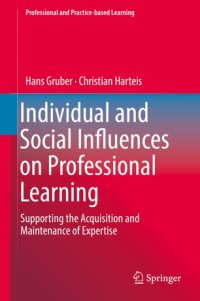
Ebook: Individual and Social Influences on Professional Learning: Supporting the Acquisition and Maintenance of Expertise
Author: Hans Gruber Christian Harteis
- Tags: Education, Professional and Vocational Education, Learning and Instruction, Personal Development, Educational Psychology, Career Skills
- Series: Professional and Practice-based Learning 24
- Year: 2018
- Publisher: Springer International Publishing
- Edition: 1st ed.
- Language: English
- pdf
This book examines professional learning and relates it to the acquisition of expertise, and the influence of individuals. Professional learning, as discussed in the book, comprises all kinds of occupational domains because employment and paid work usually follow the achievement principle, i.e. workers are expected to perform efficiently. The book suggests that the perspective of expertise research is an appropriate lens to use for gaining insight in how individuals can be prepared and enabled to autonomously master the requirements of daily working life. Expertise is understood as the capacity to reliably perform on an extraordinary level, and the basic assumption is that experts are best prepared to successfully cope with future challenges at workplaces. The book comprehensively discusses issues of expertise research and explores the nature of a successful individual and an impeded individual. It proposes an integrated model of individual and social components of expertise development, the i-PPP model. The model provides insight in and an understanding of how individuals can be enabled to develop and maintain professional expertise in the context of daily work.
Across all paradigms, researchers, policy-makers, employers and trade unionists agree that working conditions undergo permanent change through economic, societal, and technological developments. Recently, the digitalisation of (working) life became a hot topic of scientific and societal discourses. Workplaces, thus, provide challenges for individuals who have to be able to cope with workplace changes. Accordingly, new challenges emerge for an adequate understanding of learning for work as well as learning during work.